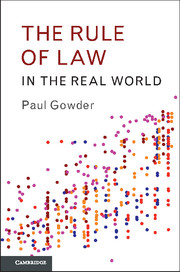Book contents
- The Rule of Law in the Real World
- The Rule of Law in the Real World
- Copyright page
- Dedication
- Contents
- Acknowledgments
- Introduction
- Chapter 1 The rule of law: a basic account
- Chapter 2 The strong version of the rule of law
- Chapter 3 Generality and hierarchy
- Chapter 4 Egalitarian liberty and reciprocity in strategic context
- Chapter 5 Isonomia: The dawn of legal equality
- Chapter 6 The logic of coordination
- Chapter 7 Parliament, Crown, and the rule of law in Britain
- Chapter 8 The logic of commitment
- Chapter 9 The role of development professionals: measurement and promotion
- Conclusion
- Notes
- References
- Index
8 - The logic of commitment
Published online by Cambridge University Press: 05 February 2016
- The Rule of Law in the Real World
- The Rule of Law in the Real World
- Copyright page
- Dedication
- Contents
- Acknowledgments
- Introduction
- Chapter 1 The rule of law: a basic account
- Chapter 2 The strong version of the rule of law
- Chapter 3 Generality and hierarchy
- Chapter 4 Egalitarian liberty and reciprocity in strategic context
- Chapter 5 Isonomia: The dawn of legal equality
- Chapter 6 The logic of coordination
- Chapter 7 Parliament, Crown, and the rule of law in Britain
- Chapter 8 The logic of commitment
- Chapter 9 The role of development professionals: measurement and promotion
- Conclusion
- Notes
- References
- Index
Summary
It is now time to weave the themes of this book together into a unified account of the relationship between the rule of law and the ideal of equality. This chapter will not present new evidence (except insofar as the results from the computer simulation reported at the end count as such), but will focus on synthesis and extension. The goal is to generate relatively bold claims about how the rule of law works in the world – claims that, strictly speaking, go beyond what is fully substantiated by the evidence and analysis offered so far, but are suggested by them; that can be explored and tested by future researchers; and that, if true, can guide policy makers in making the world a more lawful and more equal place. (The next chapter draws out some preliminary empirical and policy implications of the account of this book.)
First, let us define an analytic ontology. This book thus far has made three kinds of claims about the rule of law: conceptual/normative, strategic, and empirical.
A conceptual/normative claim is about what the rule of law is – that is, about the necessary or sufficient criteria for it to be the case that a state satisfies (to some given degree) the rule of law. I combine conceptual and normative claims because, as the rule of law is supposed to be normatively valuable, to say that a state meets the classification criteria to satisfy the rule of law to some degree is also to say that the state is, ceteris paribus, more morally valuable than it otherwise would be to a similar degree. Claims about what follows from the rule of law can be redescribed as necessary conditions for the rule of law, and for that reason, fall into this category; for example, the claim that “the rule of law makes people more equal” (in the specified respects) entails that an improvement in equality is a necessary condition for the rule of law.
A strategic claim about the rule of law is about the behavioral incentives the rule of law tends to generate, and about the social facts that tend to generate incentives to behave in accordance with the normative prescriptions of the rule of law.
Information
- Type
- Chapter
- Information
- The Rule of Law in the Real World , pp. 143 - 167Publisher: Cambridge University PressPrint publication year: 2016
- Creative Commons
- This content is Open Access and distributed under the terms of the Creative Commons Attribution licence CC-BY-NC-ND 4.0 https://creativecommons.org/cclicenses/
